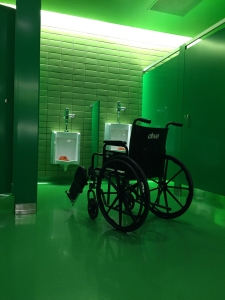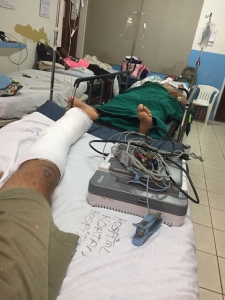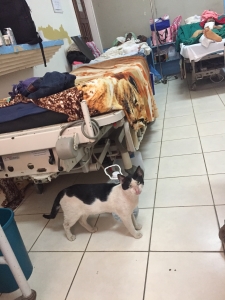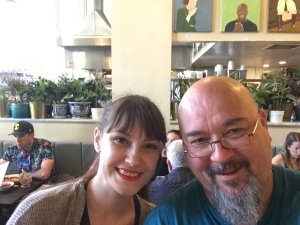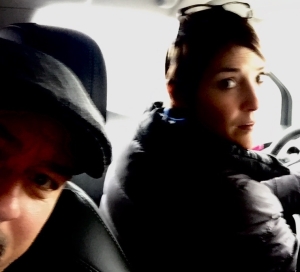2019 April 7
day three year two
one step at a time
Wheelchairs have played a recurring role this past year, beginning the day the motorbike under me slid down a road and my leg broke in two. The first wheelchair appeared hours later, had only three wheels, and a nurse suggested I use it to find surgical supplies. We were in the port city of Coxen Hole’s Public Hospital, situated in the central barrio, on a Honduran island. The port is gritty, as are most working ports. I was pretty sure I shouldn’t further expose my exposed broken bones wheeling around town.
~ physics ~
When one of the boys among a group of kids jumped from a sidewalk into the road in front of me, the forces of velocity and gravity conspired. Julio was then 9 years old, and I must’ve been quite a sight for him and his mates when they watched me try to stand. Instead, I buckled and fell, and rolled a bit. Fueled with adrenaline, and probably in some state of shock, I considered options that would soon become clear were not options. Such as catching the next da’s ship back to the mainland, as planned, and heading north to catch a flight to Norway. For a gig, who’s ship had since sailed. Physics, harumph. A crowd gathered as my mind raced.
~ think ~
Soon the very real realization that I needed to focus sunk in. A kind man named Luis helped me get to a private medical clinic, but the clinic could not intake me without my I.D., which was locked in a case back on the bike. The bike that Luis had turned-off, uprighted, and brought me the key for, which I placed in the pocket of my pants. Luis and another fellow helped stand me on my left foot and draped my arms over their shoulders that led us to a five-legged walk hop flop into the van that Luis had sorted. Moments before wrapping my foot in my sweaty middday button down shirt, while laying in the street, I told Luis I was going to take a few fotos. Taking fotos was not the obvious choice for the moment. I shared three of those images on social media, and that may have saved my life and limb. Ironically, Mark Zuckerbegr was testifying in front of the U.S. Congress that same week. Focusing a smartphone on the inside of my own bones was awakening. I needed to focus, focus on e.v.e.r.y.t.h.i.n.g. After leaving the clinic that could not intake me, an ambulance got me 500 metres up the road to the public hospital. The ambulance needed to honk its horn to alert the hospital’s security guard to unlock and roll out-of-the-way the padlocked chain-link gate. And let us in, under the midday sun. Security at Roatán Public Hospital protects people on both sides of that fence. Under a corrugated roof the ambulance rolled over the dirt and stone lane to the Emergency Room, where I’d wait the next 5 hours. After several hours of trying to keep my foot from getting knocked in the hectic corridor of the ER, I asked a nurse for an estimate of when my surgery would happen? “Hmm, necesitas encontrar suministros quirúrgicos,” she responded, and I needed to shift focus. F.Y.I., “hmm” means pretty much the same things in most languages, and yet the definition is specific to each occasion. F.o.c.u.s. The nurse said the doctor needed nylon and vicryl to operate, and I needed to buy them. Where? How? What is vicryl, exactly, and is there a substitute? How much nylon and vicryl would my surgeon need, and how much do they cost? How to find a pharmacy that might have nylon and vicryl? Focus. Find someone to take me to pharmacies, or go in my stead, to find vicryl — a thread for stitching skin. Do-re-mi-fa-so and sew, a needle pulling thread. ¡Rápido! Thinking and thinking, my eyes chanced upon the familiar eyes of a stranger. A woman I’d seen before, on the other side of the island. The eyes of a junkie, who looked as though she’d been clean for a spell. Survival is instinctual.
~ buoy ~
Bernadette, a fit figure with an old soul. Her father died on a neighbouring table/bed in that same E.R. three days earlier. My good fortune found her back there late that day, one year ago, standing at the end of my table/bed, looking at me over my shirt swaddled foot. A faded cotton bundle of sweat grit blood and a limb unnaturally bent. Gentleness looked through her feral eyes as she agreed to search nearby pharmacies. In the back pocket of my trousers I tugged out some lempira for Bernadette to go shopping, and hopefully return. Those trousers’ four pockets held some cash and my phone. Hours earlier, instinct must’ve compelled me to refuse the trousers be cut off and replaced with a hospital gown. Pockets are good. Hospital gowns are a conundrum. :20 minutes later Bernadette reappeared and handed the nurse a small bag with threads for the doctor to suture the wounds after working my tibia and fibula and talus back into their places. And then the nurse asked “where are the scalpels?” Surprise too-late-now after-the-fact medical shopping instructions became a routine over the coming weeks’ daily searches for antibiotics, anti-coagulants, gauze, sterile water, yadda yadda and yadda. And food. And toilet paper. All B.Y.O. Need to keep focused on e.v.e.r.y.t.h.i.n.g. a.l.l. t.h.e. t.i.m.e. Back into the streets Bernadette returned, with the ticking clock of the island’s end of business hours. And soon she came back with the goods. Bernadette, her ways, and her soulful eyes became a buoy.
Soon I was wheeled on that 3-wheeled wheelchair into an operating room. The furniture, equipment, and tools celebrated mid-50s contours and colours, with some wear-and-tear. A gecko stood still, upside down, on a rusted fluorescent ceiling light, overhead. Led Zeppelin played from a small boom box placed on top of a mid-century mint green hospital machine that functioned as I don’t know what. The wheelchair driver and a nurse in scrubs helped me onto the operating table, under the gecko, whom I lost track of and was nowhere in sight when the surgery finished. In the stead of anesthetics the nurse gave me her hand, to squeeze. “And a new day will dawn for those who stand long, and the forests will echo with laughter” — J. Page & R. Plant — Dr. Izaguirre is a rock star. Dr. Krosin, Oakland’s Highland Hospital Head of Trauma, kicksass too. Coincidentally, recently when I was cooking for refugees in Tijuana I met many Hondurans from the Bay Islands and eastern mainland who all knew of Dr. Izaguirre.
After three-and-a-half hours of surgery into the night, I was wheelchaired in to the Intensive Care Unit. Nine beds filled, and surrounded with families and friends who stood and sat and milled around. Some days and nights twelve of us shared the room, in such a way that side-by-side beds touched head-to-head and toe-to-toe. Nurses and doctors jockeyed our gurneys, when they’d visit. On the fuller days there was barely space enough for our I.V. drip stands, let alone a wheelchair. The hospital had four wheelchairs in all, and one had four working wheels, and none could be counted on being there when you needed one.
Our Intensive Care Unit was a friendly room, and it quickly became clear that we all would need to and could count on one another. My estimation rose on the third day in I.C.U., when Police Chief Solomon brought the mother of The Boy Who Jumped Into the Road, Mrs. de Wood, to visit. Julio de Wood’s mother was thankful. She brought pastries. That made the room happy, especially my 19/20 year-old roommate Michael, an injured soldier whose belly was always “hongry.” Our room found a good number of things to laugh about. Except when someone died, which happened twice. No one in the hospital seemed concerned about the feral cats that occasionally walked around and across our beds. However, my foreign friends, including the AngelTeam and many among the crowd that gathered around my social media posts were indeed alarmed by the cats and the geckoes and bathroom that were my world one year ago.
Hospital bathroom realities ignited my preoccupation with wheelchairs. Without going into details about b.y.o. t.p., bucket flushing, and standard t.p. in rubbish bin versus flushing, for additional reasons I actually became anxious enough about going to the bathroom that I chose not to drink water or eat much food in order to limit my need to hit the loo. This fear started with the bandages on my feet. Nearly every day of the week nurses and doctors would peel dried bandages from my wounds, and re-dress them, dry. Dry gauze, or whatever wrap was available. No need whatsoever for coffee on those mornings — it’s now nearly a year later and I still wake right the fuck up just at the thought of those dry changes. Some nurses wrapped wounds more loosely. The fresh bandages did not fit into my worn flip-flops. The journey to the bathroom in a 3-wheeled chair was slippery and dirty. The toilet just across the hall, through a swinging wooden door with no latch. Under all circumstances a wheelchair’s locked brakes are fundamental to be able to get up out of the chair (and in my case, hop to the loo), as well as ease back down into the rolling chair from a standing position (and in my case, on a pee splattered fecal freckled worn white tile floor), all the while making sure my I.V. drip bag’s dangly bits and cords didn’t get caught on anything.
Striking veins and installing I.V. ports are skills. To this day, and I reckon for a long time coming, two nickel-wide scars crease a perforation-like line above my right thumb’s main joint, where one of Roatán’s nurses broke a 2” plastic needle off under my skin, but not in a vein, and that released a lot of whatever was in the I.V. drip bag inside my swelling hand. This needle was still attached by an internal string that the nurse tugged and twisted to retrieve the buried needle. In the States a specialist inserted a P.I.C.C. line into my bicep with a foot long 35 cm tube that weaved through a vein to transport antibiotics directly to my heart. Strong antibiotics that eat through veins in a couple three days. Often it’s best to become numb, and our minds and bodies can do that.
One cringe flinch inducing wheelchair memory comes to mind from that first week, before the second surgery, during the night, when I wheeled back from the w.c. to my bedside. As I placed weight on my left leg and began to rise with the help of my arms pushing up off the wheelchair’s arms, the chair’s wheel unlocked and rolled away and I staggered and landed plum full weight on my broken ankle that was held from behind in an open plaster splint. In the middle-of-the-night darkness of the I.C.U. room I watched blood colour my bandages, like water lapping a shore, as I shifted all weight back onto my left leg, and pogo’d over to my plastic mattress. About 10 hours passed before medical personnel saw to the reopened wound. Of the few hospital staff that were not nice, that nightshift’s nurses were two who let you know they did not like to be bothered, and could be rough. All in all I want to say clearly that there are very many, most in fact, kind caring people working in Roatán Public Hospital. Almost everyone, including other patients and visitors, sincerely wanted to and did their best to help one another, as we all dealt with issues of resources.
One day I got to ride in 5 different wheelchairs in 4 different cities in 2 different countries. First there was the wheelchair that met me at the island’s airport, and another during the layover/transfer/immigration in Houston, and another at SFO, and then another greeted me in Highland Hospital’s E.R., where, several hours later, the fifth wheelchair rolled me out with my first prescriptions, on 4/20 no less, and all within the course of 21 hours.
Fast forward to the 4th of July, the week after I retired my wheelchair and graduated to crutches. Horizontal was how I had been spending most of the time. Gained a lot of weight. On July 4th a friend and I found one of Oakland’s few open places for lunch. We sat on stools at a counter. Alongside sat a woman who ordered a Manhattan. Her voice was identical to my friend Mary. Identical in tone, pitch, depth, strength, slight sand pebbles ‘n velvet rasp, pronunciation and inflection. The ‘hell-yeah, anything is possible, keep the light on’ voice that quarterbacked me from a barrio in Coxen Hole, Honduras, to the trauma unit at Highland Hospital, in Oakland, less than three months earlier. She picked up her Manhattan with her wrists. She had no hands. Fluid effortless movements raised and lowered the drink. I turned to look at her, and everything about her was more Mary, from 1980’s college days Mary to present day Mary, who hasn’t really aged, physically, since she was Bryce’s age. “Bryce,” the Manhattan drinker introduced her late 20s self, with Mary’s voice. Stepping right past the awkward is this a flirt situation(?), I pulled up a recent foto of Mary, for Bryce and my friend Christina to witness and share in the striking spectacle I was experiencing. Doppelgängers. Then, when I played a recent voice message from Mary on speakerphone, we all three felt it. Something like reincarnation. What an icebreaker. With an erector-set like teal titanium external-fixator screwed through my heel and into my tibia, fibula, talus and some metatarcels constructed on my lower right leg, hanging between our stools, I asked Bryce about life without hands. There was, and still is, a chance that my bones may be infected, which usually results in amputation. During my first State-side surgery the orthopedic surgeon discovered that the Tegucigalpan stainless steel hardware installed in my ankle was infected. So Bryce, without a moment’s consideration, looked at us and straight ahead, matter-of-factly said with the pleasance and breath of warm fresh air, that “life goes on ~ what you gonna do ~ what you gotta do ~ all we can do ~ embrace it.” She’d lost her hands due to circulation issues with wrongly prescribed medicaments. After recommending a physical therapist named Jo, she finished her drink, and as she got off the stool to go, one of her feet fell off. She scooped it up with her two wrists and without missing a beat Bryce nonchalantly made her way outside to Lakeshore Blvd., where her boyfriend was picking her up with his motorcycle. Whoosh. Awe-stricken humbled and grateful she whisked us.
The last wheelchair I depended on has driven me to unexpected places, and introduced me to extraordinary people and unbelievable experiences over these recent 9 months. Sometime around my fifth surgery I decided I would collect medical equipment to send to Roatán Public Hospital. By the time of my birthday (11.11) I accumulated 2 mint condition wheelchairs (including mine), 2 walker/strollers, 3 sets of crutches, several canes, 1 aluminum and plastic shower chair, 1 brand new aluminum plastic porta-potty, loads of ace bandages, and more helpful stuff. I researched and reached out to NGO’s, relief org’s, diplomatic missions to find a way to get the goods to Honduras. A financial undertaking beyond my means, but not out of reach of my ways.
And then Paradise, California went up in flames. The USA’s most devastating fire in recorded history. A friend suggested delivering relief supplies up to Butte County, and offered his trailer. Another friend offered his pickup truck. It takes a village. And our village filled the truck inside and out with tents, bedding, clothes, toys, foods, and all the medical equipment I’d gathered. Thanksgiving time. So smoky for weeks that sometimes you could look directly into the sun in the middle of a cloudless day from as far as Oakland, a 176 mile drive away.
The Campfire relief experience opened my eyes wide and deep. I’ve seen a lot of humanity’s glories, wonders, and foibles. Firstly the local and national media began reporting that relief supplies were no longer needed and were being turned away — that was partially true, in the case of a few aid stations that were full, overwhelmed, and/or under-staffed/resourced. Having personally experienced some of our lifetimes’ most devastating catastrophes (natural and human-made), from Hurricane Irma to Checkpoint Charlie and Czernobyl, I called bullshit. Once on location I learned there were many emergency relief centres that were gratefully accepting supplies. My suppositions were confirmed when I met Butch Fredrickson, President of Vietnam Veterans Chapter 582, who declared “when you lose everything you need everything,” as he gratefully received the pickup truck’s full load of helpful stuff.
In Chico, CA, I reconnected with a mate from Kenyon College days, whose wife and kids graciously and generously reorganized their quarters, by having their young daughter move into her older brother’s bedroom, so that I could have her room. During those fires I joined the World Central Kitchen’s Chef Relief Team, where we cooked thousands of meals for Campfire victims and first responders. That same week, WCK’s founder, Chef José Andrés, was nominated for a Nobel Peace Prize. And the Governor of California and the President of the United States and celebrities visited and pitched in.
It is important that relief efforts do not further burden already stressed local resources. In the case of Butte County’s thousands of residents whose homes had recently burned to the ground, shelter was (and still is) a serious issue. And food. WCK awakened whole new levels of my passions for food, community, and camaraderie as we brought people together with tasty hot meals, and dignity.
Although my wheelchair did not make it to Coxen Hole, our world’s small circles and my life’s spirals found me able to give back to the generous people of Honduras in other unexpected ways and places. This recent Christmas Day a friend drove me to the WCK relief kitchen in Tijuana, where volunteers of many nationalities worked together to feed refugees. Daily. Thousands of Central American and Caribbean refugees. 12-15 hour shifts, from 07:00 – 22:00, every day of the week. Non-stop, for months. Together we procured, prepped, cooked, packed, delivered, and served some 3,000 – 5,000 hot dinners each night, plus as many lunches each day, to a number of refugee shelters around Tijuana. In the Barretal shelter lived families, women, and children who slept in tents on cement floors under the cement roof of a giant re-purposed discotheque, and the men tented on the paved grounds outside, during the region’s heavy rain season, with temperatures often below 40° Fahrenheit / 4° Celsius. Thousands of people walked thousands of miles north, away from their other lives, to get here. For many reasons, dis-heartening and heartening, constantly.
WCK is currently feeding people in need in Guatemala, Haiti, Indonesia, Mozambique, Nebraska, Puerto Rico, South Dakota, and along the borders of Venezuela. During the U.S.’ federal government shutdown the WCK set up relief kitchens across the nation to feed unpaid furloughed federal workers. In Washington D.C. the kitchen popped up at 700 Pennsylvania Avenue, between the White House and Congress. Thanks to the vision and tenacity of José Andrés, a Spanish immigrant chef, dedicated to making life better for millions of people around the world, with food.
The trials and tribulations of wheelchair life have pointed me in directions unexpected, yet not-surprising. I’ve learned that there is much to be thankful for, and to improve upon, and to change, and to avoid, and to embrace, and to celebrate. Inspired, I’m now developing some fresh design concepts to support disaster relief around the world. And I have a feeling these will be game-changers, for me and the world. Boastful? Nah. Stay tuned. Better yet, ping me and let’s ketchup.
Here’s a link to a playlist of fitting tunes and videos: https://www.youtube.com/playlist?list=PLwUptkk-bSLVK2Ssq3ehWybRZwAFSk6zS, which has been a trip compiling ~ every tune puts me in a unique place. Plz add some nuggets of your own.
Thank you, all you all, for buoying
“life goes on ~ what you gonna do ~ what you gotta do ~ all we can do ~ embrace it” — Bryce —
Mary, Angel Wrangler
